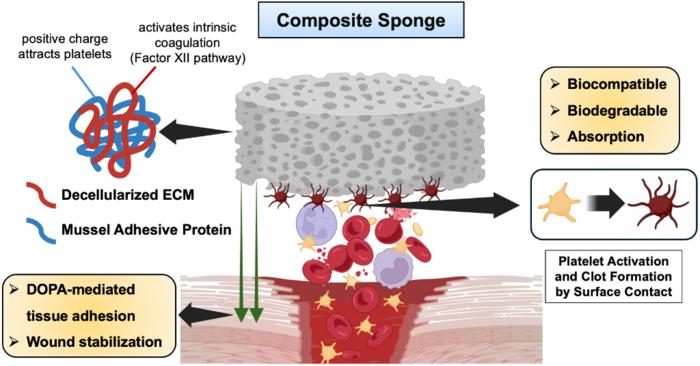In the serene turmoil of an operating theater, every second can determine life or death. For individuals suffering from injuries to internal organs, controlling blood loss is frequently a frantic competition against the clock. Now, researchers at Pohang University of Science and Technology (POSTECH) have created a bioabsorbable sponge that can swiftly stop bleeding while aiding the body’s healing process.
This innovative material merges two natural titans: mussel adhesive protein and decellularized extracellular matrix, or dECM. The outcome is a composite hemostatic sponge that adheres tightly to moist tissue, occludes wounds, and subsequently decomposes safely once its task is complete. When applied to a hemorrhaging area, it rapidly absorbs blood and establishes a strong seal that triggers the body’s natural clotting mechanisms. As the sponge disintegrates, the dECM framework facilitates tissue regeneration without provoking inflammation or leaving residual material.
## Nature’s Adhesive Meets the Body’s Blueprint
Mussels have intrigued biomaterials scientists for their remarkable ability to cling to rocks, ships, and shells amid choppy waters. Their hidden strength lies in specialized adhesive proteins abundant in catechol and amine groups, capable of forming robust covalent and hydrogen bonds even in moist conditions. By combining this natural adhesive with dECM sourced from animal tissues, the POSTECH group crafted a synthetic composite that replicates both the mechanical adhesion of mussels and the regenerative foundation of the body’s own tissue matrix.
> “This composite sponge can rapidly and safely halt bleeding even in grave internal injuries that were previously challenging to manage,” stated Professor Hyung Joon Cha of POSTECH, who spearheaded the research. “By minimizing the need for additional surgical interventions and promoting quicker recovery, it has the potential to significantly enhance patient treatment.”
The team evaluated the material using a rat model of liver damage, including subjects managed with warfarin to emulate anticoagulated bleeding. The sponge adhered effectively to the injured area and significantly reduced bleeding duration. When compared to traditional agents like Surgicel or Avitene, it resulted in less inflammation and tissue harm while expediting the initial healing phases. Microscopic examination of liver samples displayed neater wound edges and fewer indications of necrosis or fibrosis.
## From Ocean to Operating Room
This breakthrough tackles two enduring challenges in surgical hemostasis: inadequate adhesion and non-degradability. Numerous commercial products either struggle to adhere in moist settings or remain within the body, posing risks of infection or chronic inflammation. The innovative MAP-dECM composite circumvents both issues by harmonizing adhesive properties with a biodegradable design. Once hemostasis is achieved, enzymes naturally degrade it, leaving no remnants.
The ramifications extend beyond emergency medicine. Internal bleeding during tumor excisions, organ transplants, or trauma surgeries could be managed more securely, particularly for patients on anticoagulants. Given that the material breaks down in sync with the body’s healing timeline, it may also be applicable in minimally invasive or robotic operations where eliminating residual substances proves challenging.
> “By engaging the body’s intrinsic coagulation pathways, the dECM facilitates faster blood clot formation and supports wound stabilization,” the research team noted. “This synergy of adhesion and healing is crucial to its exceptional efficacy.”
The study, backed by the National Research Foundation of Korea and the Alchemist Project, has been published in *Advanced Healthcare Materials*. Its achievements highlight how insights from nature’s underwater engineers can preserve life during the most intricate human surgeries. As bioinspired design continues to blend with medical science, even the unassuming mussel could alter the landscape of emergency care.
[Advanced Healthcare Materials: 10.1002/adhm.202502994](https://doi.org/10.1002/adhm.202502994)
**No paywall exists here**
*If our reporting has informed or inspired you, please contemplate making a donation. Every contribution, regardless of size, empowers us to keep providing precise, engaging, and trustworthy science and medical news. Independent journalism necessitates time, effort, and resources—your support guarantees that we can persist in revealing the stories that matter most to you.*
Join us in making knowledge accessible and impactful. Thank you for standing with us!
